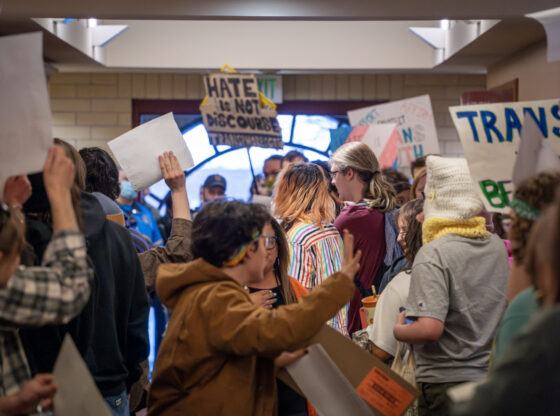In February, the Black Community Advisory Board was formed as part of the University of Denver’s Diversity, Equity, Inclusion (DEI) action plan with the goal of building support specifically for the Black community. The program is meant to advise the administration on issues, policies and actions that affect DU’s Black students and faculty.
The Steering Committee is nearing completion with the goal of an inaugural Black Community Advisory Board, to start work by April 2021. The Black Community Advisory Board will function within the Office of Diversity, Equity, and Inclusion and collaborate with Stephanie O’Malley in the Office of Government Relations and Community Affairs to discuss and revise programs/decisions, etc. that impact Black members of the community. A core aim of the Board is to hold DU administration accountable and ensure that established goals are being met, so that DU becomes a thriving academic haven for Black life, culture and scholarship.
The vision of being a great private University dedicated to the public good, coupled with the national imperative of justice and solidarity, after George Floyd’s murder (and many more deaths) propelled DU into action deciding to implement the DEI Action Plan 2020-2021. The unrest that we are witnessing across the country, the persistence of systemic oppression and exclusion from educational opportunity, participation in the economy, access to healthcare and other areas essential to social justice and human wellbeing are all factors that illuminate the need for transformation on our campus.
To help and support Black students and faculty at DU, Dr. Andriette Jordan-Fields was hired as the Black Community Experience Coordinator. Her work entails “identify[ing] programs and structures to center and value the Black experience in the intellectual and everyday life of the University.”
Dr. Jordan-Fields graduated from the University of Denver in 2017 with a doctorate in religion and theological studies. She has experience in nonprofit management and community outreach. Jordan-Fields also works with Triple Threat Ministries, a nonprofit organization with the aim of empowering, educating and equipping women, young girls and boys to overcome prejudice and barriers that prevent them from reaching their full potential.
In an interview, Jordan-Fields discussed how the university and its faculty are ill-equipped to provide a safe space for its students of color. Among the most prominent issues are “a lot of microaggressions, microinsults, microinvalidations that happen in the classroom [and] in department areas.”
Microaggressions are defined as everyday, subtle statements that demonstrate prejudice towards marginalized groups. These invalidations of identity are more common than one might think; in a study by the University of Illinois, 51% of students of color reported being stereotyped in their classes. When professors are not trained to call out and correct these invalidations, the burden falls to students.
Students are left to choose whether they will engage in harmful conversation or remain silent. “If you say anything about injustice, you’re characterized as too defensive and sensitive,” Fields explained.
Openly discussing prejudice and holding white peers accountable can often lead to negative repercussions for Black students standing up for themselves. Ultimately, many of DU’s mostly white professors aren’t ready, comfortable or equipped to have these conversations.
To this end, the goal of the Black Community Advisory Board is to support the University in becoming proactive as opposed to reactionary. This approach engages both students, staff, faculty and alumni across campus to “represent the DU Black community, centering their voices, experiences, needs and hopes for an academic journey that is inclusive, equitable, culturally affirming and empowering.”
According to Dr. Jordan-Fields, developing a Black Studies Institute or Critical Race department is essential to providing a safe space for students of color, as it will empower students and faculty, staff and alumni as they navigate systems of power and privilege in an effort to make this campus and the world a better place for all of humanity.
Earlier this month, the DU administration announced the development of a Critical Race and Ethnic Studies major. The program is meant to explore intersectionality and power dynamics across socio-political and cultural contexts on and off campus. Critical Race studies can also supplement various other fields, such as law and journalism.
“[It is important that DU has] a place where faculty and students and staff can engage in courageous conversations and do some excellence in intellectual scholarship. [This should be] a place that galvanizes people to have those conversations without feeling guarded or worried about retaliation.” Dr. Jordan-Fields said.
The creation of these spaces would improve the social and academic experiences of the university’s BIPOC community. Misrepresentation or lack thereof strains the mental and physical well-being of marginalized students.
In March, a steering committee composed of Students, Faculty, Staff, alumni and community members convened to determine the vision, mission of the organization and its structure. A final roster will be decided by April. The Board aspires to provide strategics expertise and valuable advice on how the University can better serve, recognize and support the Black community members on campus. The initiative also hopes to address the idea of racial battle fatigue in the university’s Black students, staff, and faculty. Racial battle fatigue is the experience of constant microaggressions, fear and intimidation that wears down the individual both emotionally and physically and mentally.
The initiative also seeks to address the presence of racial battle fatigue in the university’s Black students and faculty. Racial battle fatigue is when one experiences constant microaggressions, fear and intimidation that wears down the individual both emotionally and physically.
The establishment of the Black Community Advisory Board is one of the first steps toward creating a more equitable and safer environment at DU. For more updates pertaining to the DEI initiative and Black Community Advisory Board, you can peruse DU’s action plan here.











